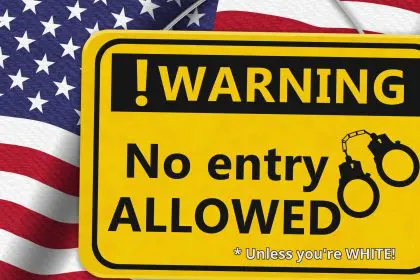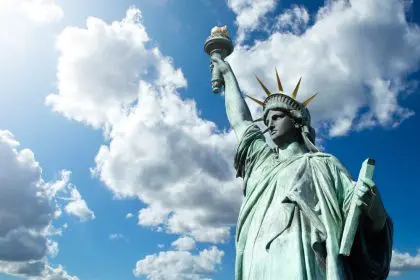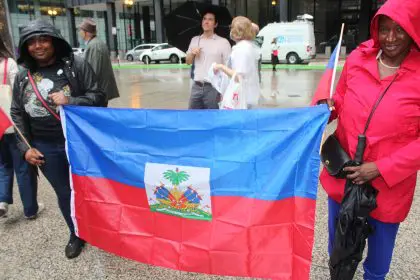A group of 49 white Afrikaner South Africans granted refugee status by the Trump administration departed Johannesburg Sunday night on a U.S. government-funded charter flight bound for Dulles International Airport. The unprecedented resettlement effort marks the first tangible outcome of President Trump’s February executive order claiming minority Afrikaners face persecution in South Africa, an assertion vigorously disputed by the South African government and independent analysts.
Expedited refugee processing
The Afrikaner families, descendants of primarily Dutch colonists who arrived in South Africa centuries ago, traveled with multiple suitcases but declined media interactions at the Johannesburg airport. According to documents obtained by NPR, the refugees will be greeted at Dulles by U.S. officials and are scheduled to hold a press conference upon arrival before continuing to final destinations across several states including Minnesota, Nevada, and Idaho.
The remarkably swift processing of these refugee applications, approximately three months from executive order to arrival, stands in stark contrast to typical refugee procedures, which often take years. This expedited timeline has raised significant questions among immigration experts and refugee advocates.
One U.S. government employee, speaking anonymously due to lack of authorization, characterized the situation bluntly as immigration fraud, highlighting the unusual nature of the accelerated process.
Resettlement support structure
Documentation provided to the Afrikaner refugees outlines a comprehensive resettlement framework. Those with American family members will receive assistance from relatives, while others will be placed in a location that has a local organization to provide support. The Catholic diocese of Virginia’s refugee services office will be present at Dulles to offer immediate assistance.
The guidance materials explain that case managers will transport arrivals to arranged housing, which may initially be temporary accommodations such as hotels until more permanent solutions are secured.
The South Africans have been informed they are expected to support yourself quickly in finding work and should be prepared to accept entry level employment in fields like warehousing, manufacturing, and customer service while working toward higher-level positions over time.
Notably, the documents caution that credentials from South Africa may not automatically transfer to the United States, a significant consideration for farmers among the group who have previously expressed hopes of continuing agricultural work in America.
As officially recognized refugees, the South Africans now have a pathway to U.S. citizenship and eligibility for government benefits.
South African government response
The resettlement has triggered forceful opposition from South African authorities, who maintain there is no factual basis for refugee status claims. President Cyril Ramaphosa’s spokesman, Vincent Magwenya, delivered a pointed rebuke of the U.S. action when contacted by NPR.
Magwenya stated that these people would not be stopped from going, despite what he described as a false narrative. He asserted there is no legal or factual basis for the executive order sanctioning this action, and that none of the provisions of international law on the definition of refugees are applicable in this case.
He added that South Africa’s sovereignty as a country is being grossly undermined and violated by the United States through these actions.
Contested claims of persecution
The Trump administration’s executive order, which also suspended U.S. aid to South Africa, cited unfair treatment of minority Afrikaners and alleged government land seizures as justification for the refugee program. However, independent analysis indicates these claims lack substantive evidence.
While the South African government did implement land reform legislation earlier this year theoretically allowing for expropriation without compensation in rare circumstances, no land has actually been seized. Current property distribution remains highly skewed, whites represent approximately 7% of South Africa’s population yet continue to own roughly 70% of commercial farmland.
This disparity stems from the legacy of apartheid, the segregationist system implemented by Afrikaner nationalists that formally ended in 1994 when Nelson Mandela led the transition to multiracial democracy.
Public reaction in South Africa
The announcement of Afrikaner refugee status has provoked widespread incredulity across South African society. Many citizens, both Black and white, have expressed concern that the program threatens to undermine three decades of reconciliation efforts following apartheid’s end.
Social media has been flooded with satirical content mocking the refugee claims, with posts suggesting departing whites will miss their privileged lives, domestic workers, and beach holidays, highlighting the economic advantages many white South Africans continue to enjoy.
Nevertheless, socioeconomic circumstances vary widely across racial groups, and some Afrikaners, like other South Africans, have experienced violent crime and economic hardship. These personal narratives will likely form the basis of their refugee claims upon arrival in the United States.
Broader immigration context
The Afrikaner resettlement occurs against the backdrop of significant restrictions on other refugee admissions. In January, the Trump administration effectively suspended the standard U.S. refugee admissions program, creating what refugee advocates describe as a humanitarian crisis.
Kenn Speicher, founder of NOVA Refugees, a Washington D.C. area support network, explained that across the country, refugee resettlement agencies have closed or cut staff, and for refugees about to fly to the U.S., travel authorizations were cancelled, leaving thousands stuck waiting and facing growing danger.
The contrast between the expedited processing for Afrikaner applicants and the suspended status of refugees from other global crisis zones has sparked criticism from humanitarian organizations and immigration policy specialists.
Settlement destination planning
The 49 Afrikaners represent just the first group in what could become a larger migration pattern under the executive order. According to government documents, subsequent arrivals may follow similar resettlement procedures, with reception facilities prepared to provide food and items for the children.
The selection of Minnesota, Nevada, and Idaho as initial settlement locations aligns with regions that have historically welcomed agricultural workers and have existing communities with European cultural heritage. However, these destinations also raise questions about potential political considerations in the resettlement planning process.
For Afrikaner farmers hoping to continue agricultural work, the transition may prove challenging despite resettlement support. American agricultural practices, regulatory environments, and market conditions differ substantially from South African contexts, potentially necessitating significant professional adjustments.
International relations implications
Beyond its immediate impact on the refugees themselves, the program threatens to strain diplomatic relations between the United States and South Africa, historically one of America’s stronger partnerships on the African continent.
The South African government’s characterization of the refugee program as a sovereignty violation signals a potential cooling of bilateral ties that could extend beyond the Trump administration’s immediate policy priorities.
Moreover, the executive order’s explicit racial dimension, focusing specifically on white South Africans, has generated concern among international human rights organizations about the precedent it establishes for refugee policy determinations based on racial or ethnic identity rather than internationally recognized persecution criteria.
As the first Afrikaner refugees prepare to arrive at Dulles, both supporters and critics of the program will be watching closely to see how their resettlement unfolds and whether their personal narratives align with the administration’s broader claims about conditions in South Africa.











